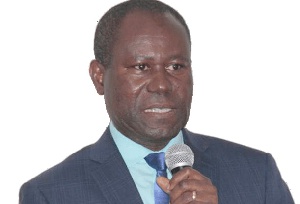 COCOBOD Chief Executive, Joseph Boahen Aidoo
COCOBOD Chief Executive, Joseph Boahen Aidoo
With the current crop of cocoa farmers fast aging, it is feared that without involvement of the youth in cocoa farming many people whose livelihoods depend on a sustainable cocoa supply chain risk losing their jobs, COCOBOD Chief Executive Joseph Boahen Aidoo has said.
The situation, among others, can also affect the foreign exchange earnings that is derived from the country’s sale of cocoa on the world market. This is because cocoa is a universal cash crop par excellence, supporting the economies of producing countries like Ghana.
“The future of the cocoa industry in Ghana is the youth of the Republic. However, research evidence suggests that, currently, the average age of cocoa farmers is 55 years. The aging cocoa farmer is thus a threat to sustainability of the industry,” Mr. Boahen Aidoo stated.
To help address this menacing development, the Ghana Cocoa Board is said to be implementing some productivity-enhancing initiatives with the objective of raising farm productivity from the current average of 450 kilogrammes per hectare to 1,500 kilogrammes per hectare.
He said: “Our focus is to solve the low productivity puzzle and lay a firm foundation that will stimulate the youth’s interest and make cocoa production a target-business venture”.
Mr. Boahen Aidoo, in a speech read on his behalf at the maiden edition of the MASO youth in cocoa conference in Kumasi, noted that the artificial pollination exercise begun last year testifies that farm productivity can be raised and make farmers more productive than the rest of the world.
According to the Cocobod CEO, business farmers among the pilot farms pollinated harvested not less than 20 bags from the one-acre plot, which is around 600 percent more than the previous record of 3 bags.
“We are going further to consolidate gains from the pollination programme by increasing intake to 30,000 in 2019 from 20,000 in 2018.” – Adding that the youth in cocoa communities constitute the bedrock of successes chalked up so far.
So far, 1000 out of the 10,000-youth engaged for the exercise have been recruited and trained in leadership and entrepreneurial skills at the Bunso Cocoa College; and 2000 more youth are expected to be added.
In addition to this, Cocobod has also launched a coca rehabilitation programme to treat and replant swollen shoot virus disease-ravaged and over-aged coca farms nationwide.
The programme is projected to rehabilitate 680,000 hectares of CSSVD affected and farms in the over-aged class.
The disease-free cocoa farms are expected to facilitate attainment of the 1,500 kilograms per hectare output objective, while freeing some lands for the production of other crops to support government’s industrialisation programme.
The Country Representative of Solidaridad West Africa, Suzan-Hermina Yemidi, explained that the MASO youth in cocoa programme – also known as the next generation youth in cocoa programme – is being done to encourage and develop youth to take up cocoa farming.
The programme has two components: the agro academy that trains youth to become professional cocoa farmers; and the business academy which trains the youth to develop businesses that provide services to support actors in the sector and in cocoa growing communities.
“Since its inception in January 2016, the programme has trained a total of 4,300 youth in two cohorts within the first two years of implementation. The third cohort, which is currently running, has over 2,000 young men and women under training.”
She explained that decision to focus on the youth among others follows growing concern over aging cocoa farmers.
Thus, she said: “If efforts which encourage the youth to have an interest in and take up cocoa farming are not intensified, the future of cocoa production will be in jeopardy – with its potential consequent reduction in foreign exchange earnings”.
However, given the potential for youth economic empowerment contributing to reduce youth unemployment, Solidaridad aims to be part of the solution by equipping the youth with skills required to enable them successfully operate as confident and informed entrepreneurs within the cocoa value chain.